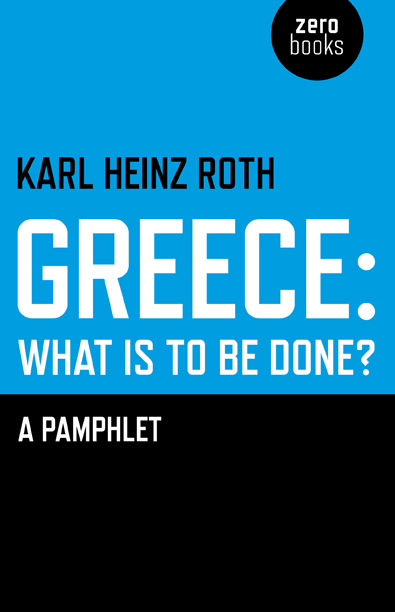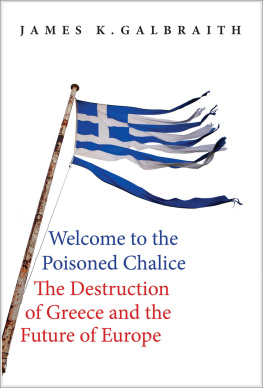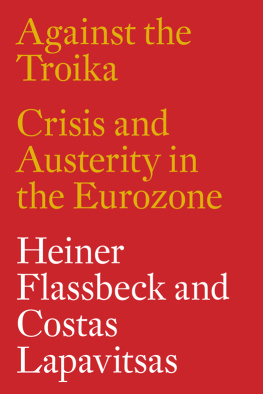Karl Heinz Roth - Greece: What is to be Done?: A Pamphlet
Here you can read online Karl Heinz Roth - Greece: What is to be Done?: A Pamphlet full text of the book (entire story) in english for free. Download pdf and epub, get meaning, cover and reviews about this ebook. year: 2013, publisher: John Hunt Publishing, genre: Romance novel. Description of the work, (preface) as well as reviews are available. Best literature library LitArk.com created for fans of good reading and offers a wide selection of genres:
Romance novel
Science fiction
Adventure
Detective
Science
History
Home and family
Prose
Art
Politics
Computer
Non-fiction
Religion
Business
Children
Humor
Choose a favorite category and find really read worthwhile books. Enjoy immersion in the world of imagination, feel the emotions of the characters or learn something new for yourself, make an fascinating discovery.

- Book:Greece: What is to be Done?: A Pamphlet
- Author:
- Publisher:John Hunt Publishing
- Genre:
- Year:2013
- Rating:5 / 5
- Favourites:Add to favourites
- Your mark:
- 100
- 1
- 2
- 3
- 4
- 5
Greece: What is to be Done?: A Pamphlet: summary, description and annotation
We offer to read an annotation, description, summary or preface (depends on what the author of the book "Greece: What is to be Done?: A Pamphlet" wrote himself). If you haven't found the necessary information about the book — write in the comments, we will try to find it.
Greece: What is to be Done?: A Pamphlet — read online for free the complete book (whole text) full work
Below is the text of the book, divided by pages. System saving the place of the last page read, allows you to conveniently read the book "Greece: What is to be Done?: A Pamphlet" online for free, without having to search again every time where you left off. Put a bookmark, and you can go to the page where you finished reading at any time.
Font size:
Interval:
Bookmark:

Greece and the Eurozone Crisis:
What is to be done?
A Pamphlet
Karl Heinz Roth

Winchester, UK
Washington, USA
First published by Zero Books, 2013
Zero Books is an imprint of John Hunt Publishing Ltd., Laurel House, Station Approach, Alresford, Hants, SO24 9JH, UK
www.johnhuntpublishing.com
www.zero-books.net
For distributor details and how to order please visit the Ordering section on our website.
Text copyright: Karl Heinz Roth 2012
ISBN: 978 1 78099 824 4
All rights reserved. Except for brief quotations in critical articles or reviews, no part of this book may be reproduced in any manner without prior written permission from the publishers.
The rights of Karl Heinz Roth as author have been asserted in accordance with the Copyright, Designs and Patents Act 1988.
A CIP catalogue record for this book is available from the British Library.
Design: Stuart Davies
Printed and bound by CPI Group (UK) Ltd, Croydon, CR0 4YY
We operate a distinctive and ethical publishing philosophy in all areas of our business, from our global network of authors to production and worldwide distribution.
CONTENTS
Before the Greek Debt Crisis
In the Vortex of the World Economic Crisis
Greece Under De Facto Forced Administration
The Papadimos Interim Government and the Radicalization of the Troikas Austerity Course
The Fourth Austerity Program of 12 February 2012
The Negotiations with Private Creditors
By Order of the Financial Corporations: The Implementation of the Troika-Diktat until March of 2012
Greek Society on the Brink
Interim Conclusion: The Consequences of the Austerity Policies
The Monster of Instrumental Reason
Deflation and Inflation: A Collective Exploitation Squeeze
A Largely Fictitious Debt Cut
A Mockery of Democracy
German Rigor and German History
The Problem of an Alternative
System-Inherent Approaches
What is to be Done? Perspectives from Below
Time to Act
Greece in the Crisis: Basic Macro-Economic Data
Hubris needs putting out, even more than a house on fire. (Heraclitus)
.
This [the cultural heritage of antiquity] is what we have fought for it is not for sale.
(General Makryjannis, revolutionary and Greek freedom fighter, 1821)
O No!
(Greek response to the Italian ultimatum of 28 October 1940)
death to fascism!
(Slogan of the Greek resistance against the German occupation, 19411944)
! , , ! Down with the junta! Bread, education, liberty!
(Slogan of the students in Athens protesting the military dictatorship, 1973)
..
Seventy years ago, we fought bravely against German tanks and planes. Now the Germans are arriving in suits and ties and we dont know what to do.(Remark by an elderly Greek man, made during a conversation with the author in a kaphenion in the city of Ioannina, April 2011)
Before the Greek Debt Crisis
In the spring of 2012, the euro crisis intensified dramatically. The epicenter of the crisis is Greece, a country that has been experiencing a severe recession since the beginning of the world economic crisis. What outcome this recession will yield is a decisive question not just for Greece, but for all of Europe and indeed for the entire world economy. We need therefore to consider the story behind this crisis, and the restructuring programs imposed, since May of 2010, by the so-called troika (the European Commission, the European Central Bank and the International Monetary Fund). We also need to consider possible alternatives to these restructuring programs.
In 1981, Greece became a member of the European Community. A spirit of optimism prevailed in the country. The Socialist Party (PASOK), an offshoot of the Pan-Hellenic Resistance Movement against the 19671974 military dictatorship, had won the parliamentary elections for the first time. Due to its welfare-oriented platform, PASOK enjoyed widespread popular support.
As the conservative Karamanlis government stepped down, there began an era of social, cultural, scholarly and economic progress. This trend was in no way affected by the monetary restrictions associated with the European Monetary System that had been introduced within the European Community in 1979.
Greece was not to join this system until 1993. Like the currencies of the other new southern European member states (Portugal and Spain), the drachma was kept outside the currency agreement. While the intra-European disparities in economic development entailed certain distortions of competition, the Greek government was able to compensate for their effects by periodically devaluing the Greek currency. Thus there was little pressure to reconfigure Greek economic policy on the model of the European Communitys core states. Between 1979 and 1992, the drachma was depreciated by 86 percent. In this way, the prices of Greek exports to the European Communitys core states were lowered almost by half. Conversely, the prices of West German and French exports to Greece were increased almost by half.
This monetary and economic approach, favorable to Greece and the other countries of the European periphery, became unviable in 1992. Responding to the pressures engendered by the crisis-ridden development of their own national economies, the governments of the European Communitys core states imposed a new framework, which has gone down in the annals of economic history as the Maastricht Treaty. It was designed to establish the contractual foundations of the European Communitys transition to the European Union. The so-called convergence criteria at the core of the Treaty established parameters for inflation, national budgets, exchange rates and interest rates. They also introduced a cap on annual debt (three percent of the gross national product or GDP), thereby setting the course for the introduction of a single currency, the euro.
PASOK had been re-elected as the governing party in 1993. Its economic decision-makers and planners now found themselves in a squeeze. For Greece as for other countries, implementation of the Maastricht standards entailed abandonment of a policy of full employment that had until then been bolstered by a robust welfare state. The Greek government was forced to begin working towards the flexibilisation of employment relations and the deregulation of the public sector. Officially, it played along and made an effort to improve the public sector s economic efficiency. But due to pressure exerted by Greeces strong union movement, effective deregulation and the lowering of mass incomes were out of the question. It was only in 1996, when the neoliberal Kostas Simitis replaced the deceased Andreas Papandreou as head of government and curbed the influence of PASOKs previously dominant party left, that the consensus on the welfare state was significantly challenged. If the floodgates were still not opened all the way, this was because there emerged within parliament a stable left-wing opposition that acted in concert with the traditionally influential communist bloc at critical moments. Major strikes and social struggles limited the extent of the welfare and wage cuts. However, Greeces competitiveness on the European market declined continuously. As a result, the country went from a positive to a negative trade balance and its budget deficit soared. Even prior to the late 1990s, the budget deficits annual increase exceeded five percent of GDP, and total debt soon exceeded annual economic growth. These were blatant violations of the criteria stipulated in the Maastricht Treaty, and so the emergent scenario of over-indebtedness was veiled by means of statistical manipulations. By the late 1990s, Greek policy was significantly out of step with the process of neoliberal restructuring that countries such as England, France and Italy had been undergoing since the 1980s, and which was also increasingly evident in Germany and the Low Countries.
Font size:
Interval:
Bookmark:
Similar books «Greece: What is to be Done?: A Pamphlet»
Look at similar books to Greece: What is to be Done?: A Pamphlet. We have selected literature similar in name and meaning in the hope of providing readers with more options to find new, interesting, not yet read works.
Discussion, reviews of the book Greece: What is to be Done?: A Pamphlet and just readers' own opinions. Leave your comments, write what you think about the work, its meaning or the main characters. Specify what exactly you liked and what you didn't like, and why you think so.








